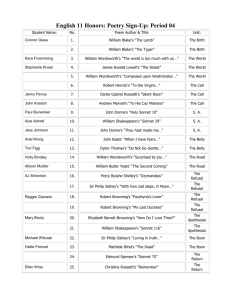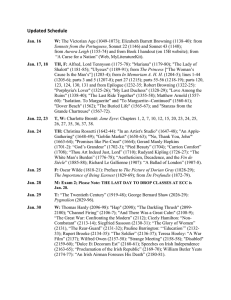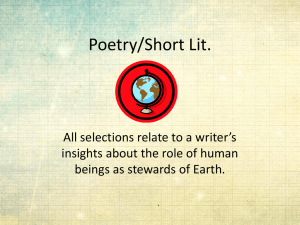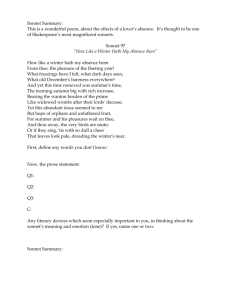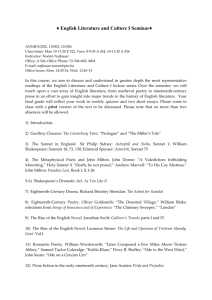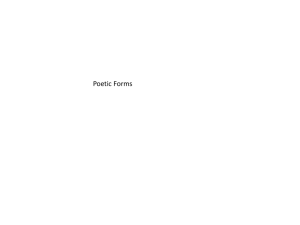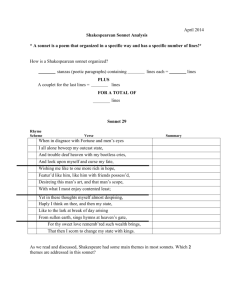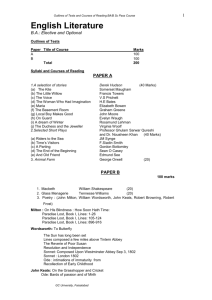ENLT2100Fall15Syll
advertisement
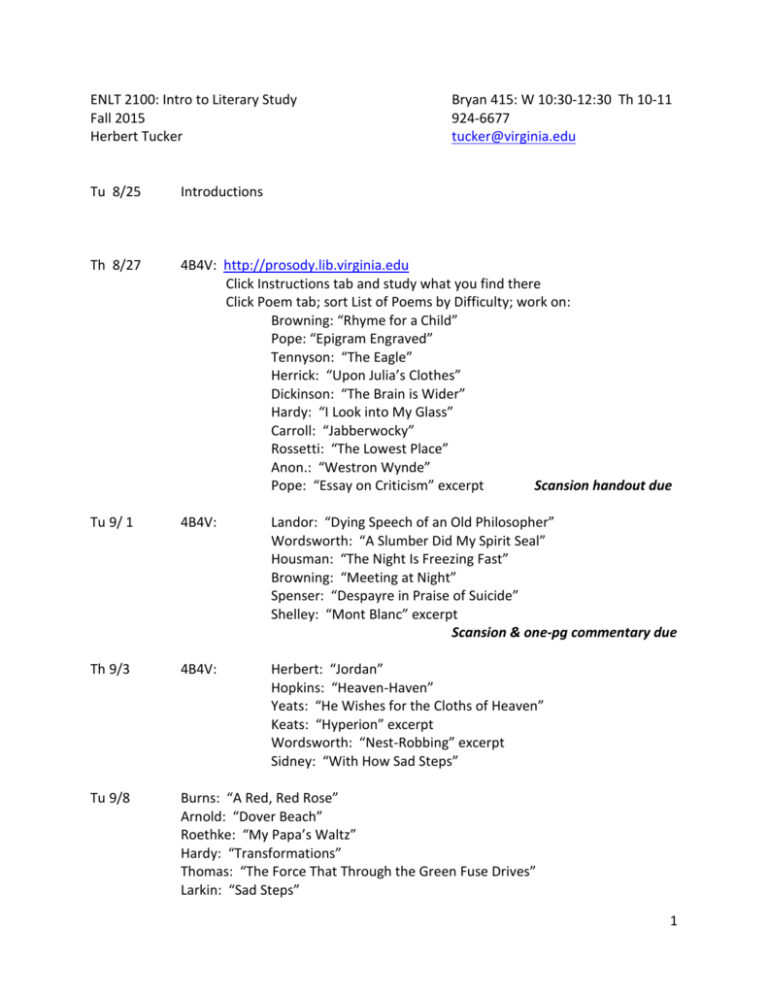
ENLT 2100: Intro to Literary Study Fall 2015 Herbert Tucker Bryan 415: W 10:30-12:30 Th 10-11 924-6677 tucker@virginia.edu Tu 8/25 Introductions Th 8/27 4B4V: http://prosody.lib.virginia.edu Click Instructions tab and study what you find there Click Poem tab; sort List of Poems by Difficulty; work on: Browning: “Rhyme for a Child” Pope: “Epigram Engraved” Tennyson: “The Eagle” Herrick: “Upon Julia’s Clothes” Dickinson: “The Brain is Wider” Hardy: “I Look into My Glass” Carroll: “Jabberwocky” Rossetti: “The Lowest Place” Anon.: “Westron Wynde” Pope: “Essay on Criticism” excerpt Scansion handout due Tu 9/ 1 4B4V: Landor: “Dying Speech of an Old Philosopher” Wordsworth: “A Slumber Did My Spirit Seal” Housman: “The Night Is Freezing Fast” Browning: “Meeting at Night” Spenser: “Despayre in Praise of Suicide” Shelley: “Mont Blanc” excerpt Scansion & one-pg commentary due Th 9/3 4B4V: Herbert: “Jordan” Hopkins: “Heaven-Haven” Yeats: “He Wishes for the Cloths of Heaven” Keats: “Hyperion” excerpt Wordsworth: “Nest-Robbing” excerpt Sidney: “With How Sad Steps” Tu 9/8 Burns: “A Red, Red Rose” Arnold: “Dover Beach” Roethke: “My Papa’s Waltz” Hardy: “Transformations” Thomas: “The Force That Through the Green Fuse Drives” Larkin: “Sad Steps” 1 Coleridge: “Frost at Midnight” Emerson: “The Snow-Storm” Browning: “My Last Duchess” Th 9/10 Cowper: “The Poplar Field” Melville: “The Maldive Shark” Dickinson: “I Heard a Fly Buzz” Barrett Browning: “A Musical Instrument” Spender: “The Pylons” Larkin: “Ambulances” Wilbur: “The Death of a Toad” Stafford: “Traveling through the Dark” Fr 9/11 1000-word essay due on a poem Tu 9/15 Th 9/17 Munro: “In Sight of the Lake,” “Leaving Maverley,” “Pride” Munro: “Gravel,” “Haven” Tu 9/22 Th 9/24 Munro: “Corrie,” “Train” Munro: “Amundsen,” “Dolly” Tu 9/29 Surrey: “Love, That Doth Reign” Ralegh: “Three thinges there bee” Spenser: Sonnet 75 Sidney: Sonnets 1, 47, 71 Shakespeare: Sonnets 18, 29, 30, 55, 73, 130, 146 Donne: Holy Sonnet 14 Milton: “On the Late Massacre”; “When I Consider” Wordsworth: “Composed upon Westminster Bridge”; “Nuns Fret Not” Shelley: “Ozymandias” D. G. Rossetti: “Sonnet” Th 10/1 Hardy: “Hap” Hopkins: “The Windhover,” “Pied Beauty” Scott: “Watkwenies” Frost: “Design” Millay: “Love Is Not All” Macleish: “The End of the World” Cummings: “i thank You God” Parker: “Sonnet for the End of a Sequence” Avison: “Butterfly Bones” Owen: “Dulce et Decorum Est” MacEwen: “The Discovery” Atwood: “This Is a Photograph of Me” F 10/2 700-word paper due on sonnet 2 Reading Days Th 10/8 Review sonnet and short story Tu 10/13 midterm exam Th 10/15 Shakespeare: A Midsummer Night’s Dream through act 2 scene 1 T 10/20 finish MND Th 10/22 recap MND re performance; team up viewing agenda due in class Sat 10/24 ASC performance in Staunton 2 pm T 10/27 panel discussion of performance Th 10/29 Gilman: The Sweetest Swing in Baseball T 11/3 no class, but Th 11/5 T 11/10 Th 11/12 T 11/17 Ellison: Invisible Man Th 11/19 class meets in Alderman Library electronic classroom T 11/24 wrap-up IM attend Helms Theater 8 pm 800-word stage/page paper due 1500-word resourced paper due on Ellison Thanksgiving T 12/1 Milton, “Lycidas” Gray, “Elegy Written in a Country Churchyard” Hardy, “The Convergence of the Twain” Yeats, “Easter 1916” Auden, “In Memory of W. B. Yeats” Lowell, “For the Union Dead” 3 Th 12/3 Shakespeare, “Fear no more the heat o’ th’ sun” Jonson, “On my first Sonne” Wordsworth, “She dwelt among the untrodden ways” Tennyson, “Break, break, break” Housman, “The night is freezing fast” Stevens, “The Emperor of Ice-Cream” Ransom, “Bells for John Whiteside’s Daughter” Millay, “Dirge Without Music” Roethke, “Elegy for Jane” Larkin, “An Arundel Tomb” Walcott, “A Letter from Brooklyn” Plath, “Daddy” Awoonor, “I Rejoice” Heaney, “The Grauballe Man” T 12/8 exam review F 12/18 9-noon final exam 1000-word elegy paper due POLICIES & HOMILIES From the mission of this course – which is to get you in shape for the English major – several corollaries directly follow. You should attend class faithfully, letting me know promptly if illness or genuine emergency must keep you away. You may skip two meetings during the semester scot-free.1 Each absence beyond this allowance, however, unless expressly excused for the reasons just mentioned, will incur a demotion of one notch in your final grade for the course (e.g., B to B minus). The same stigma attaches to tardy submission of written assignments. It may go without saying, but I’ll say it here anyhow, that preparation of our reading assignments before class constitutes a major part of the work for this course. Only rarely will I be laying out a problem from scratch; you will have a meaningful say in determining the course of our conversations; and accordingly you will find our group discussions fruitful in direct proportion to the fidelity, curiosity, and retentiveness with which you’ve read the text beforehand. And, may I add, the inter-activity. Reading literature well is a co-creative process. In the first instance, we collaborate with the author – struggle, conspire, dance, fence, but at all 1 Exceptions: Everybody must attend our two plays, and everybody must be at the library for our 11/19 session. 4 events take an active part in the literary transaction. Passive, drowsy, or distracted reading is hardly worthy of the name. Much the same holds true, for most of us, about merely solitary literary experience. That’s why, in the second instance, we make it a point to collaborate with each other in talking books over. Because everybody in this class will read things differently, discussion lets us multiply, test and adjust our reactions. I hope you will learn here both to rejoice in concurrence and to be invigorated by disagreement, which is not the bane of literary study but its staple. If you’re too bashful or aloof to quarrel, you’ll be cheating yourself, as well as your classmates, of something precious. The same is true, many times over, of out-and-out cheating, which we call plagiarism when it takes the form of passing off without clear acknowledgment somebody else’s thinking and writing as your own, and which when detected in this course not very long ago resulted in a student’s having to withdraw from the University. That’s academic felony. Don’t get close to it. Real reading is faithful and creative, appreciative and critical; a high discipline, it takes you out of yourself into the imagination of human difference and it takes you deeper into yourself as you make fresh acquaintance with your own mind, returned to you by literary detour with interest, or with what Emerson called “alienated majesty.” You’ll get out of this course what you put in, and then some. Grading basis: 60% written work, 30% exams, 10% class participation. 5
